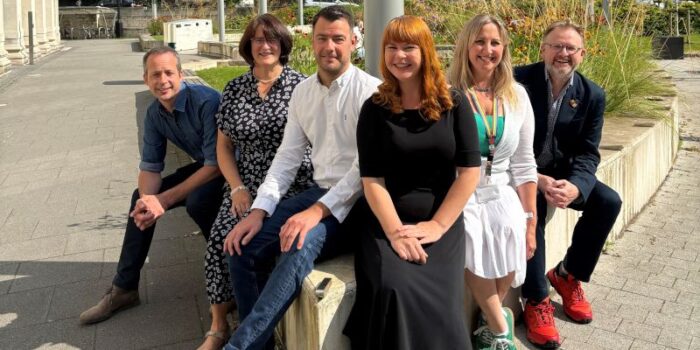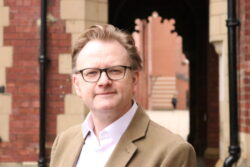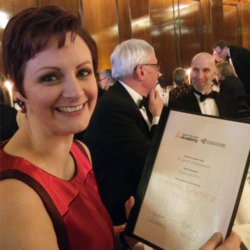Our NTF and CATE Award Holders
On this page, you can browse our list of National Teaching Fellowship (NTF) and Collaborative Award for Teaching Excellence (CATE) award holders. You can also read reflections from some of our recent NTF winners on the award and their advice for colleagues.
Information about all the award winners are available on the Advance HE NTF winners webpage and Advance HE CATE winners webpage. In addition, our external advisor for these awards, Peter Hartley (NTF), provides his reflections on the benefits of teaching awards.
List of NTF and CATE award holders
National Teaching Fellows (NTF)
Note: All titles were correct at the time of award.
- 2024 Dr Pam Birtill
- 2023 Dan Trowsdale
- 2022 Professor Bee Bond
- 2022 Professor Karen Burland
- 2022 Dr Nick Cartwright (awarded through a nomination from his previous institution, the University of Northampton)
- 2021 Dr Alison Voice
- 2020 Professor Paul Taylor
- 2017 Professor James Pickering
- 2017 Dr Samantha Pugh
- 2016 Dr Ralph Hallet (no longer at the University of Leeds)
- 2016 Professor Sarah Underwood (no longer at the University of Leeds)
- 2015 Dr Chrissi Nerantzi (awarded whilst working at Manchester Metropolitan University)
- 2015 Dr David Lewis
- 2015 Professor Nigel Lockett
- 2013 Professor Andrea Jackson
- 2013 Professor Simon Lightfoot
- 2012 Professor Neil Morris (no longer at University of Leeds)
- 2012 Professor Christina Leston Bandeira (awarded whilst working at the University of Hull)
- 2010 Professor Denise Bower
- 2009 Professor Martin Levesley
- 2008 Dr Joanna Drugan (no longer at University of Leeds)
- 2008 Dr Kate Exley
- 2007 Professor Graeme Gooday
- 2006 Professor Chris Megone
- 2006 George McDonald Ross (no longer at University of Leeds)
- 2006 Professor Trudie Roberts
- 2005 Professor Mike Savage (no longer at University of Leeds)
- 2005 Chris Butcher (no longer at University of Leeds)
- 2004 Professor Deborah Murdoch Eaton (no longer at University of Leeds)
- 2003 Professor Michael Manogue
- 2002 Professor Pauline Kneale no longer at University of Leeds)
- 2001 Professor Ian Hughes (no longer at University of Leeds)
- 2001 Emeritus Professor Mick Wallis (awarded whilst working at Loughborough University)
Collaborative Award for Teaching Excellence (CATE)
- 2025 Education and Pharmaceutical Industry Collaboration (EPIC) - find out more on the EPIC Advance HE profile or read more about EPIC on the Staff Intranet (UoL login required).
- 2024 Teaching and Learning Enhancement NeTwork (TALENT) - find out more on the TALENT Advance HE profile or visit the TALENT SharePoint site (internal access only)
- 2022 Dr Chrissi Nerantzi was part of the #creativeHE team, a cross institutional team which was awarded the CATE award in 2022. (awarded whilst working at Manchester Metropolitan University)
- 2021 The Capstone Experience Team, led by Dr David Lewis
Reflections from NTF and CATE award holders
Discover insights from our NTF and CATE award holders as they reflect on their journeys to achieving these prestigious awards. They share their experiences and offer practical advice for colleagues who are considering applying for these awards in the future.
Education and Pharmaceutical Industry Collaboration (EPIC) – CATE 2025
Team members: Dr Chris Randall, Dr Dimitra Mitsa, Professor Aysha Divan, Professor Michelle Scott, Andy Gibbs and Dr Sian Estdale.

The EPIC team (clockwise from top left) Dr Chris Randall, Dr Dimitra Mitsa, Professor Aysha Divan, Professor Michelle Scott, Andy Gibbs and Dr Sian Estdale.
“Receiving the CATE award is a deeply meaningful moment for our team. This award celebrates not only our achievements in transforming biopharmaceutical education, but also how we work – through shared leadership, trust, collaboration and a constant drive to keep improving. We’re proud to now be part of a national community striving for excellence in teaching, and we look forward to building on this success, expanding our reach and inspiring future partnerships, while continuing to keep students at the heart of everything we do.”
Preparing a CATE submission is more than just an opportunity to showcase impact - it’s a chance to reflect deeply on how your team works. One of the most valuable lessons we learned during the process was the importance of balancing the what with the how.
It’s easy to focus solely on the innovations and outcomes your team has achieved, but the CATE award celebrates both impact and collaborative spirit. That dual focus prompted us to look more closely at the ways we work together, how leadership is shared, how decisions are made and how trust and mutual respect shape our progress.
As we developed our claim (which went through many drafts so be prepared for many revisions!), we began to notice patterns in our practice as well as gaps we hadn’t fully acknowledged before. The process became an exercise in honest reflection on our values, our methods and the culture we’ve built as a team.
Our advice to future applicants is to embrace that reflective space. Don’t rush to write the “perfect” narrative from the start. Instead, allow time to explore your team’s story from multiple angles. The insights you gain along the way will not only strengthen your application but also deepen your understanding of what makes your collaboration meaningful.
You will not be alone in this process, though. We were fortunate to be supported by experienced colleagues and the OD&PL team, whose guidance was invaluable. Their feedback, sometimes challenging but always constructive, helped us sharpen our thinking and refine our narrative. The CATE application is probably unlike anything you’ve written before, so our advice is to welcome that “tough love” and make the most of the support available. It’s not just about writing a strong application; it’s about learning from the process and growing as a team.
Teaching and Learning Enhancement NeTwork (TALENT) – CATE 2024

Duncan Borman, Joanne Shiel, Craig Evans, Hayley Whitefoot, Samantha Pugh and Dan Trowsdale, founders of TALENT.
For the founders of the Teaching and Learning Enhancement NeTwork (TALENT), the CATE Award is significant as it is an external validation of the creation of something like TALENT.
The award further raises the profile of the group across the University. Hopefully, this will increase the esteem in which TALENT membership is held and encourage more staff to join, be motivated and excited to contribute to events while sharing ideas and best practice. It will also be a springboard for increasing the external profile of TALENT and the work of its members.
The real value has been to create a community across the faculty, which has helped colleagues get to know other staff across schools and gain ideas and inspiration from what others are doing. Some staff from different schools have gone on to apply for LITE projects together, which probably wouldn’t have happened before TALENT.
The CATE Award is also excellent for increasing the visibility and importance of scholarship, providing a boost for all teaching and scholarship in the faculty, and helping with esteem and career development. Establishing TALENT was the hardest part, but now, working together is the easiest and most rewarding part of all. There is a willingness to share experiences across our combined knowledge base. This makes co-creating events and workshops seem very natural and continues to be a great deal of fun.
Dr Pam Birtill - NTF 2024
 "Achieving National Teaching Fellowship (NTF) is a validation of my career to date, and an endorsement of my values. When writing my applications I reflected deeply on my values – trying to find the ‘golden thread’ that pulls it all together. I settled on fairness – this is what drives much of the work I’ve been doing in my assessment lead role. Ensuring fairness in assessment requires inclusivity, transparency, and authenticity. This underpins my work on the hidden curriculum, and my research examining the student experience.
"Achieving National Teaching Fellowship (NTF) is a validation of my career to date, and an endorsement of my values. When writing my applications I reflected deeply on my values – trying to find the ‘golden thread’ that pulls it all together. I settled on fairness – this is what drives much of the work I’ve been doing in my assessment lead role. Ensuring fairness in assessment requires inclusivity, transparency, and authenticity. This underpins my work on the hidden curriculum, and my research examining the student experience.
I was invited to apply for the NTF after winning the University of Leeds sustained excellence in teaching awards. The process was fascinating, meeting regularly with my mentors to work on the draft. I started with the story of my journey through academia - how my academic identity has built over time.
It started over 20 years ago, when I started a Postgraduate Certificate in Academic Practice (PGCAP) course, and learned about reflective practice, which has been a hallmark of my work since. To me reflective practice often starts with writing. My advice for building teaching practice is to write about it. Explain what you are doing, why, what impact it has had, and what you will do differently next time. Consistent evaluation of impact helps when evidencing practice for either fellowship applications or promotions.
My next key moment was external examining. Visiting other institutions, talking about teaching, education, transformation, with colleagues elsewhere, and getting down into the details of how other programmes, departments and institutions function is vital. I’ve worked at Leeds for over 2 decades, but working with other institutions has provided me with a sector lens on my discipline.
My teaching has developed in many ways – embracing technology, supporting students in various admin positions, and of course the pandemic. My best teaching is the teaching that I enjoy, where I get excited about the material, or try and find ways to make the assessments fun and engaging. If students enjoy the work, its enjoyable to mark.
Reflecting on my career for the NTF application has helped me to develop a richer understanding of my practice. Achieving NTF will give me a platform for the next stage of my career, whatever direction it takes."
Dan Trowsdale - NTF 2023
 "It is absolutely amazing to have been recognised as a National Teaching Fellow. I have been inspired for many years by the work of colleagues who are already NTFs so I am thrilled and a little shocked, to be recognised alongside those very colleagues who inspired me. The award has boosted my confidence enormously.
"It is absolutely amazing to have been recognised as a National Teaching Fellow. I have been inspired for many years by the work of colleagues who are already NTFs so I am thrilled and a little shocked, to be recognised alongside those very colleagues who inspired me. The award has boosted my confidence enormously.
I was honoured that senior colleagues believed in my teaching and scholarship and have been overwhelmed with the generous support from the NTF support team at Leeds – Peter Hartley and Kate Exley have been remarkable and very patient during the application process.
I thoroughly recommend succumbing to the reflective process as it was very rewarding, it was tough, but certainly worthwhile and I feel I have grown as a result. I now have a very different personal view of my scholarship and teaching and what motivates me as an educator.
Thanks also to Bee Bond who reviewed round three of my ‘final’ draft and encouraged me to be bolder and more confident in my text. It is a real privilege to work alongside such colleagues at the University of Leeds, enjoy the mental space to develop, and to have such world class support.
I am very excited to embrace the opportunity to work with fellow NTFs and hope to gain insights from the opportunities that the network offers while I continue a path in research on designing and visualising pedagogical approaches in teaching and learning.
If others are interested in developing their teaching or scholarship my advice is very simple:
- Follow your passion and find others who share it. Reach out and connect with them. I have been lucky enough to find this amongst LITE fellows and also in TALENT. Finding likeminded people will ignite your own ideas and also create lasting friendships. Meet with them, build on your ideas with them, ask them for help.
- Test your ideas, build prototypes and make them real. Show your ideas to trusted colleagues and certainly try it out with your students.
- Build a portfolio of evidence. Plan to have several scholarship projects running in parallel, each with a run up of about 2-3 years before you collect data, write it up and disseminate. Collect evidence along the way. Learn to incorporate ethical approval so you can share any outputs."
Professor Bee Bond - NTF 2022
 "For me, the most important part of becoming a National Teaching Fellow was the process of completing the application itself. It took me three attempts to get the award. The fact that senior colleagues at Leeds believed my work is valuable enough to give me three chances was as validating as the award itself. It also gave me the confidence, some of the supporting evidence and the right ‘writing mindset’ to apply for promotion at the same time. I became a professor before I became an NTF in the end!
"For me, the most important part of becoming a National Teaching Fellow was the process of completing the application itself. It took me three attempts to get the award. The fact that senior colleagues at Leeds believed my work is valuable enough to give me three chances was as validating as the award itself. It also gave me the confidence, some of the supporting evidence and the right ‘writing mindset’ to apply for promotion at the same time. I became a professor before I became an NTF in the end!
My area of work relies heavily on cross-institutional collaboration and recognition of the value of what we all do in the Language Centre. Writing the application, talking to my mentor about our work (thank you Peter Hartley!) and collecting evidence of its impact really helped me to recognise for myself what we have already achieved. The award has provided public recognition of an area of work that remains side-lined or hidden in many institutions. The possibility of new connections and collaborations available through the NTF networks will, I hope, help to make my discipline and the students we work with more visible and valued.
My advice to colleagues who are developing their teaching profile would be:
- Mentor and support others. There is intrinsic reward in developing mentoring relationships and watching the success of those you mentor, but you also learn enormous amounts yourself from their practice. This is particularly true when they work in a different discipline.
- Become a PRiSE assessor (once you become a Senior Fellow of Advance HE). This gives you great insight into the range and wealth of practices across Leeds, helps you really understand how a good application of this kind should be written and gives you a ready-made community of other assessors who are hugely knowledgeable and willing to share
- Take the time to read, reflect and engage in the scholarship of others. We spend a lot of time doing in student education, but it’s important to have a theoretical understanding of why you do what you do and to be able to articulate this to others.
- Take chances. Don’t be afraid to experiment and try out new things, making sure you do it ethically and systematically and are prepared to learn from failures as much as from success."
Professor Karen Burland - NTF 2022
 "Being awarded one of this year’s National Teaching Fellowships feels simultaneously unbelievable, exciting and incredibly special! To be selected as one of the institution’s nominees was, in itself, very flattering, given the number of outstanding educators that work within the university. The process of reflection involved in the NTF process has been valuable for helping me to identify my values as an educator. It provided me with the opportunity to bring together the impact of my teaching and research throughout my career. It has been extremely fulfilling and a great reminder of why I do what I do! I am extremely proud to now be joining the community of NTFs and to receive such prestigious national recognition of my impact as an educator and student education leader. As I embark upon my new role as the University’s academic lead for Surfacing Skills and Student Futures, this award gives me confidence that my work is having a positive impact on students at Leeds and on the wider network of HE educators. I am excited to work with the wider network of NTFs, to learn more about their practice, to share my own, and to develop future collaborations.
"Being awarded one of this year’s National Teaching Fellowships feels simultaneously unbelievable, exciting and incredibly special! To be selected as one of the institution’s nominees was, in itself, very flattering, given the number of outstanding educators that work within the university. The process of reflection involved in the NTF process has been valuable for helping me to identify my values as an educator. It provided me with the opportunity to bring together the impact of my teaching and research throughout my career. It has been extremely fulfilling and a great reminder of why I do what I do! I am extremely proud to now be joining the community of NTFs and to receive such prestigious national recognition of my impact as an educator and student education leader. As I embark upon my new role as the University’s academic lead for Surfacing Skills and Student Futures, this award gives me confidence that my work is having a positive impact on students at Leeds and on the wider network of HE educators. I am excited to work with the wider network of NTFs, to learn more about their practice, to share my own, and to develop future collaborations.
My advice to colleagues developing their teaching profile would be:
- Reflect on your values and purpose as an educator; what matters to you and why?
- Take on student education roles and use them to learn and to develop your practice and scholarship; read, listen to what others are doing, share your ideas, and initiate collaborations to try out new ideas.
- Immerse yourself in any student education networks available – in your school/institution/discipline; keep an open mind and be inquisitive.
- Seek (funded) opportunities to test new ideas/practice as pilot studies: reflect, refine and try again.
- Keep a diary of the positive things – feedback from others, new ideas – tested and refined. Note the small successes/failures - they will help you tell your story in the future.
- Seek out collaborations within and beyond your discipline/school/university/country; different perspectives are so valuable for developing informed and influential ideas and practices.
- Consider the implications and applications of your learning and practice; how might your insights help/inform/benefit others?"
Dr Nick Cartwright - NTF 2022

"My research and scholarship over recent years has focused on the educational experiences of students from minoritised backgrounds. This has shaped my practice and informed every part of what I do as a teacher from curriculum design, through assessment to pastoral support. It is important to me that when students are brave and honest enough to share their experiences with me that I give a platform to those experiences and amplify them so their voices are heard, hopefully improving things for future cohorts. This fellowship is important because it helps to amplify those minoritised voices and, I hope, will make those students feel that their contribution to improving higher education is valuable.
My contribution to the national debate on HE is grounded in the belief that education can be empowering but can also be a tool of oppression. This perspective is often seen as critical and has been criticised by many, including those in government shaping educational policy. This Fellowship is therefore a timely reminder that those of us who come from the critical pedagogy and critical race theory traditions are making a positive contribution to shaping a more inclusive and transformative HE sector and it is important to have this recognised.
To help me develop my critical reflexivity I started the Anti-racist Book Club with my partner in 2018. It has met most months since, usually online, and brings together a range of people from different backgrounds. Studying key anti-racist texts and discussing them with others has really helped me develop my reflexivity and understand my privilege in a positive way. I would encourage everyone to explore their positionality and think about how heteronormativity, patriarchy, ableism and whiteness (amongst other things) have impacted who they are and their professional practice.
I remember being told that evidencing impact is different from esteem and this helped me prepare my nomination. Esteem may be because of impact but it is not sufficient evidence of it. It’s also important to be able to talk about what your contribution was to all the projects you discuss – what you did collectively as a team is important but this is an individual award and therefore the assessors need to understand what your individual contribution was. Finally, collect evidence of everything, save those tweets about your conference presentations or those grateful emails from students because that’s all evidence.
There is an active network of existing NTF and CATE holders at Leeds and this gives me a great opportunity to get involved working with them. Advance HE also encourage and facilitate collaborative work between National Teaching Fellows so I am hopeful that I’ll get involved in some really interesting collaborative projects with other universities. There’s no doubt this recognition will enhance my network and I’m sure I can look forward to being kept busy with exciting L&T projects for a long time!"
View Nick's University staff profile. Nick's nomination for National Teaching Fellowship was made whilst working at the University of Northampton where he worked from 2013-2022.
Dr Alison Voice - NTF 2021

"Being awarded a National Teaching Fellowship is special in so many ways. Firstly, being invited by senior staff at Leeds to apply for an NTF is confidence boosting in itself, that others recognise what you do, and acknowledge that you are worthy of making the application. Secondly, receiving feedback from the reviewers at Advance HE affirms that external educators see the value of your work, and its impact on students, staff and stakeholders in the field. It is also nice that Advance HE makes a big splash about celebrating the achievements of all its new NTFs, showing they really value the scheme and the achievement. This publicity is also a good way to further extend your national profile.
There are several networks run by Advance HE specifically for NTFs which you are invited to join when you win. This immediately connects you with a diverse group of people across all HE institutions and disciplines, but all with one thing in common, being an NTF. And for me, the real excitement is the national recognition that the award of NTF brings, which facilitates the development of new and extended collaborations.
My advice to colleagues developing their teaching profile would be:
- Keep an ongoing record of what you have done, at Leeds and in the national/international arena. It’s hard to recall it all when needed!
- Keep a record of nice things people say about you. This is useful evidence/quotes for your application.
- Depending on your career stage, elect to be mentored, or offer to mentor other staff. This will help tease out your talents and skills. It’s often easier to have others recognise and extol your virtues. And the success of your mentee is evidence of your impact.
- Try to involve yourself in the national scene, whether through discipline committees, conferences, workshops etc. Offer to take on a specific role. This leads to impact and recognition of your work nationally/internationally.
- Apply for funding for teaching initiatives. Even small amounts show your success and impact."
Professor Paul Taylor - NTF 2020
 "Preparing my NTF claim was a valuable exercise in reflecting on my own career. For the last decade, my professional development has focused on leadership in University teaching. I have completed the Leadership Programmes of both the University of Warwick and of UoL. Beyond these, I have striven to develop through my own scholarly research on leadership themes, engaging with colleagues, the literature and the international pedagogic community to explore new approaches and adopt best practice.
"Preparing my NTF claim was a valuable exercise in reflecting on my own career. For the last decade, my professional development has focused on leadership in University teaching. I have completed the Leadership Programmes of both the University of Warwick and of UoL. Beyond these, I have striven to develop through my own scholarly research on leadership themes, engaging with colleagues, the literature and the international pedagogic community to explore new approaches and adopt best practice.
I came to realise that my personal development as a leader in Higher Education has led me to my characteristic approach. Firstly, initiatives I lead are always grounded in critical pedagogic thinking, making it easier to articulate my ideas and increasing the likelihood of success. Secondly, I build effective collaborations across and beyond my institution, bringing together like-minded colleagues and students to work towards our shared goals. Recognition of these ideas through my NTF award has given me increased confidence to take on new challenges.
In terms of building my profile, the single best thing I did I think was to become a part of the ISSoTL community, attending the annual conferences on a regular basis and joining and leading special interest groups. I have genuinely made friends (and great colleagues) for life through ISSoTL. My work with them and their testimony for my claim was (and still is) very important."
Professor Sarah Underwood - NTF 2016
 "For me, becoming a National Teaching Fellow was instrumental in providing the confidence to go ahead with a Professorial promotion application at the University of Leeds. It still feels quite rare to have such a public and high profile recognition of your teaching experience and the efforts that go into continually innovating your approach so this award was really special to me.
"For me, becoming a National Teaching Fellow was instrumental in providing the confidence to go ahead with a Professorial promotion application at the University of Leeds. It still feels quite rare to have such a public and high profile recognition of your teaching experience and the efforts that go into continually innovating your approach so this award was really special to me.
It was immensely beneficial to have the external validation and visibility in the school/University as various senior people were involved in the NTF application and the DVC for Student Education even attended the award ceremony! The NTF award was the primary way I was able to evidence having a ‘sustained record of high quality teaching’ and the examples, quotes and evidence I gathered for the NTF application have been used many times since. (And just in case you were wondering, I got the Professor promotion!)."
